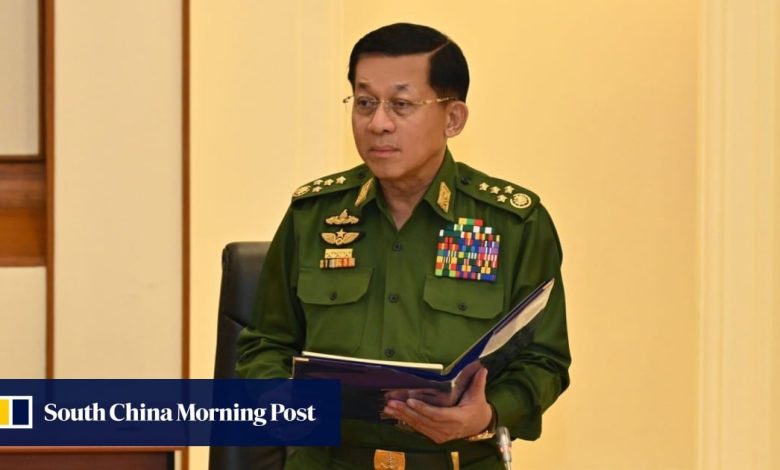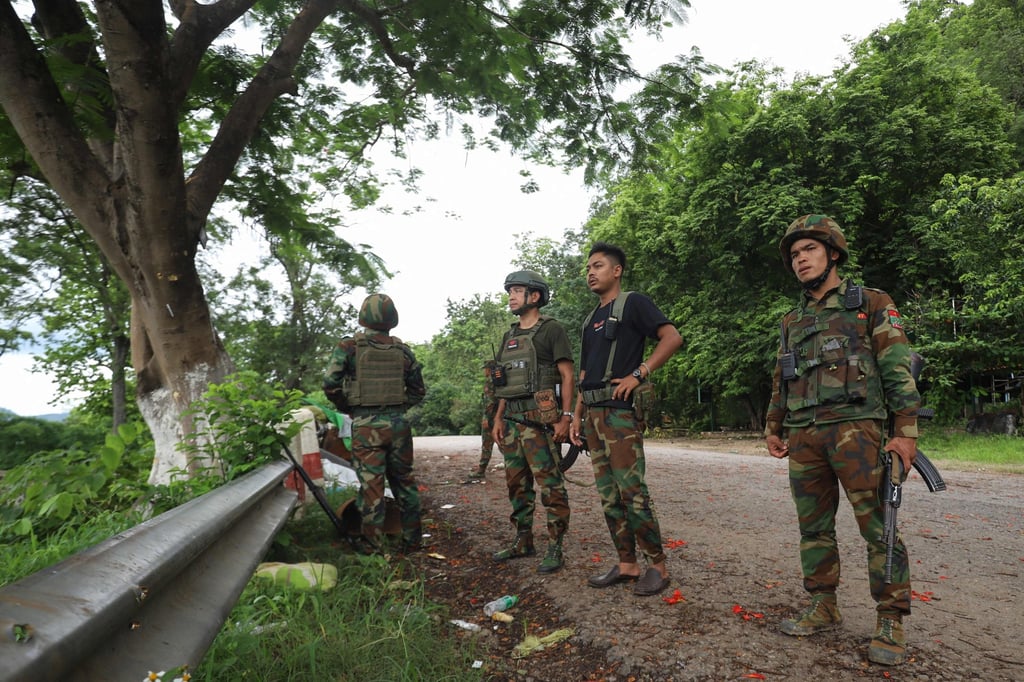As Myanmar junta holds out on elections, peace talks with rebels, could China rethink its support?

Since the coup in February 2021, General Min Aung Hlaing had repeatedly promised an election, saying that the 2020 poll was riddled with widespread voter fraud. Last month, he promised a free and fair election next year.
Upon seizing power, the military put the country under emergency rule for a year and had extended its rule every six months. Meanwhile, the protest movement has morphed into an armed rebellion that has widened and is now posing a threat to the regime.
On Monday, the junta said it had lost communications with commanders of the Northeast Command in the city of Lashio, a strategically important army headquarters in the country’s northeast and the second-largest city in Shan State.
Noting that this was the sixth extension of the emergency, Jason Tower, country director for the Burma programme at the United States Institute of Peace think tank, said the decision was widely expected.

An off-ramp
“[It was also] part of Min Aung Hlaing’s reasoning for appointing himself president several weeks ago,” Tower said, adding that the Myanmar strongman was under increasing regional pressure, especially from China, to hold an election.
Last month, Min Aung Hlaing replaced Myint Swe as acting president, with the latter on medical leave.
“China sees elections as a possible off-ramp for the military,” Tower said, noting that Beijing’s recent outreach to the retired reformist president Thein Sein sent a strong signal of China’s desire for Min Aung Hlaing “to change gears”.
In late June, Chinese Foreign Minister Wang Yi met Thein Sein, who ruled from 2011 to early 2016, in Beijing.
“The reality is that Min Aung Hlaing lacks the capacity and influence to organise even a sham election, much less anything remotely close to a free and fair election”.
“If China exerts greater pressure on the regime, he may follow through with this, but based on the battlefield situation, it is unclear as to how many more six-month extensions Min Aung Hlaing’s regime can weather,” Tower said.
He also noted China was presently pushing the warring parties – the military and the Three Brotherhood Alliance (3BHA) – to resume talks, which had broken down in May.

The Three Brotherhood Alliance is made up of ethnic armed groups: the Arakan Army, the Myanmar National Democratic Alliance Army, and the Ta’ang National Liberation Army.
Since the launch of a major offensive at the end of October, the coalition has overrun dozens of military outposts and taken control of several towns in the north near the border with China.
However, Min Aung Hlaing had rejected the talks, Tower said, adding that Beijing currently saw the military as “the main problem” given its unwillingness to come to the table, its continued air strikes on the Myanmar-China border – including two aerial assaults last week on Laukkai city killing 10, and the military’s weakening security influence across the country.
Hunter Marston, a Southeast Asia researcher at the Australian National University, said while an election next year could be expected, it was likely to be incomplete and far from representative of the entire population.
“The military will not be able to conduct elections in roughly half of the country’s territory,” Marston said.
Min Aung Hlaing said last Wednesday that elections would be held first in areas where it was safe to do so, while his regime tried to bring “stability and security” to other conflict zones.
Marston noted that while the outcome of an election was unlikely to be recognised by the Myanmar population and the international community, it might be “sufficient” for Min Aung Hlaing to pave the way to a military government “recognised by China and India”.
“[The move will also] invite enough participation from ethnic political parties previously disenfranchised by the [former] National League for Democracy government”.
During the 2020 election, polling was cancelled in parts of the states of Rakhine, Shan, Kachin, Kayin and Mon due to various levels of unrest.
“Any acceptance from various factions within Myanmar could divide the resistance and prolong the military’s hold on power – Min Aung Hlaing’s ultimate goal,” Marston added.
Mikael Gravers, associate professor emeritus at Denmark’s Aarhus University, said China might have hoped Min Aung Hlaing would agree to an interim government that included the former deposed National Unity Government and the resistance forces.
“Thein Sein might be seen as a potential leader of this interim rule all parties can agree upon before new elections,” Gravers said, adding that if the capital, Naypyidaw, came under attack, political prisoners including former state counsellor Aung San Suu Kyi could be in danger.
Adding that China had helped negotiate a ceasefire in Shan State in January even as fighting later resumed, Gravers said Chinese diplomats had met Thein Sein, ostensibly to urge them to intervene as Beijing was concerned about border security and wanted better protections of its investments.

“In June Thein Sein – not Min Aung Hlaing – was invited to Beijing,” Gravers said, adding that Thein Sein was placed under surveillance when he returned.
Htwe Htwe Thein, an associate professor at Australia’s Curtin University, said it was unlikely the junta was going to win back any of its lost ground any time soon and “the likelihood is that the regime will lose even more”.
“Talk of elections is not consistent with the real situation on the ground,” she said, adding that as territories fell into the hands of the resistance forces, China would be rethinking seriously and urgently which side it should be on, “or at least which side China should be stepping up negotiations with”.
Htwe Htwe Thein also pointed to the need for integrated and concerted efforts by the international community to solve the crisis.
“Now is the time for governments in the region and around the world to be preparing scenario planning for a post-military regime Myanmar and national reconstruction and humanitarian assistance,” she said.






